› Forums › 2024 Summer Courses › HistoryEssayWriting-Wed
- This topic has 36 replies, 7 voices, and was last updated September 4, 2024 by
Beth.
-
AuthorPosts
-
-
at 13:33 #42138
Beth
ParticipantSummary for Lesson 1
In today’s class we began our lessons on the Russian revolution by thinking about the idea of revolution itself. We spoke about the causes and conditions behind revolutions- from weak tyrannical government to poverty and inequality- and used this as a lens through which to examine Russia pre-1917. We discussed whether Russia fit the criteria for revolution to occur, analysed quotations on revolution fitting this to Russia and finally spoke about the theoretical and ideological impetus behind the Russia revolution, learning about Marx and his theory of history. Amazing work everyone- particularly in the research tasks which you all completed beautifully. You should all be proud of your work today, well done 🙂
Revolution definition video: https://www.youtube.com/watch?v=856kcVieUgU
Russia overview video: https://www.youtube.com/watch?v=KOK1TMSyKcM
Marxism video: https://www.youtube.com/watch?v=g54GedUuxeI
Homework
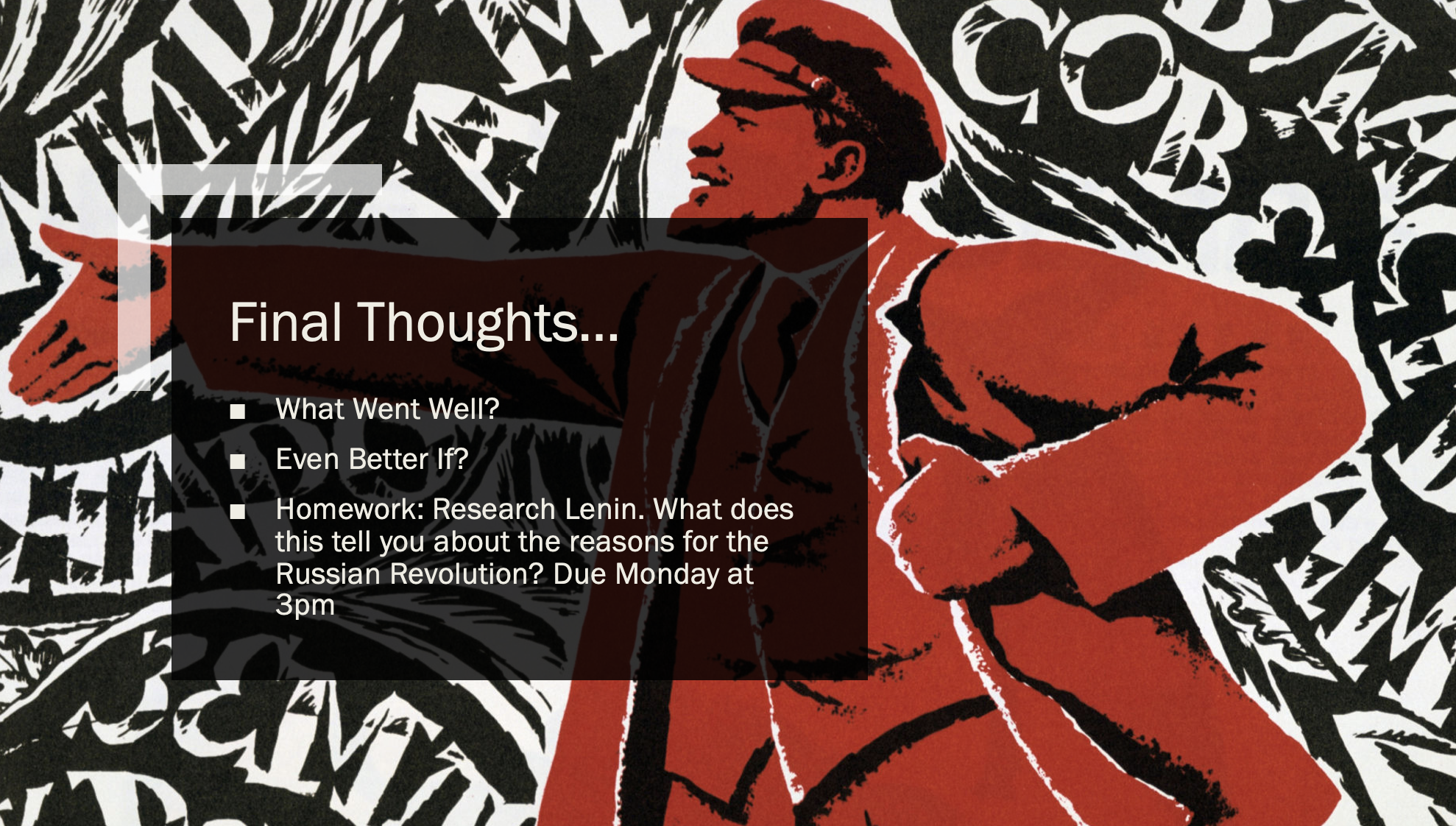
Attachments:
You must be logged in to view attached files. -
at 18:02 #42231
Jessica
ParticipantVladimir Lenin, who was originally born Vladimir Llyich Ulyanov in 1870, played a pivotal role in the Russian Revolution in 1917. As a staunch revolutionary and Marxist theorist, Lenin believed that the only way to bring about true social and economic change was through a violent overthrow. Of the existing tsarist regime. In April 1917, Lenin returned to Russia from exile and immediately began rallying the Bolsheviks to seize power, emphasising the need for a ‘dictatorship of the proletariat’ to establish a socialist state. Through his political manoeuvring and the Bolsheviks growing influence, Lenin was able to orchestrate the October Revolution later that year, toppling the provisional government and installing the Bolsheviks as the new ruler of Russia. This event marked the beginning of the Soviet era and the eventual formation of the Union of Soviet Socialist Republics (USSR), with Lenin as the first leader of the new Bolshevik state.
Lenin returned to Russia in 1917 after years in exile. During the October Revolution, he helped orchestrate the Bolschevik seizure of power. Nicholas II fall of power/ Bolshevik’ success, was for a variety of reasons. Firstly, there were many economic difficulties in Russia at that time. However, the Provisional Government failed to address the same problems. The price of goods at that time were increasing and the supply of food were decreasing. The government also couldn’t guarantee enough grain, ammunitions of weapons for the troops fighting in war. Another reason why the Bolsheviks’ success were the continuation of war. Many citizens of Russia wanted the war to decease happening, but the provisional government decided to continue Russia’s involvement. This upset many people and led to the downfall of Nicholas II’s fall of power. Lenin established the Communist party (the Bolsheviks’) party as the ruling power in Russia.
As the first leader of the Soviet Union, Vladimir Lenin’s impact on 20th century global politics and the rise of communism cannot be overstated. Through the implementation of Marxist-Leninist ideology and policies, including the nationalisation of industries and the collectivisation of agriculture, Lenin firmly established the foundations of the communist state. His unwavering commitment to the Bolshevik Revolution and the formation of the Soviet Union would go on to shape the course of global events for decades to come, with the influence of Leninism and its offshoots felt across the world.
-
at 11:26 #42290
-
-
at 18:02 #42232
Renren
ParticipantHomework for last lesson :
Lenin was born into an upper middle class family and was born kn the 10th of April 1870.lenin became a revolutionary socialist after his brothers execution. He was expelled from school for taking part in anti tsarist protests. After he spent many years studying law. He moved to Saint Petersburg in 1893 where he became a very well respected Marxist activist. He was exiled in 1897 for three years. After this he moved to Western Europe where he became a prominent member of the Russian social democratic Labour Party. (RSDLP)In 1903 he led the now split RSDLP leading his faction ( the bolsheviks against Julian Martovs faction ( The Mensheviks) after the 1917 revolution he became a major part of the October revolution where they overthrew the tsarist government. I believe that one of the main reasons that he hated the tsarist government was the execution of his brother . A fact that shows how much he devoted his life to Marxism was that even though he was born into quite a rich family he still advocated for more equality of the people and the government.According to Lenin’s view of Marxism he thought that humanity would eventually reach pure communism. To try and bring the people equality his thought was that he would make everyone a worker of the state so everyone was equal. I believe that the Russian revolution happened because of the tsars awful way of ruling. In Russia there were only three classes. The mega rich such as the tsars family and other high ranking nobles and generals. The second was the high middle class. They would own much land and would make serfs farm on their land. The last were the serfs they were practically slaves being owned by their overlords and this is what caused the revolution. Too many people were unsatisfied with their lives and wanted equality and this is also how Marxism became so popular with the poor serfs
-
at 11:32 #42295
-
-
at 18:22 #42305
Beth
ParticipantSummary for Lesson 2
In today’s class we studied the seeds of revolution, learning about the context of the Tsar’s Russia. We discussed feudalism and learnt some key terms related to this period of history, before thinking about Rasputin and what he as a character can show us about pre-Revolutionary Russia. We completed some source work analysing a cartoon from the time, looked at the life of Nicholas II and his failings and finally finished by thinking about the question of what made him so unpopular. Intuitive and perceptive work everyone- very good discussion on Rasputin’s place in history in particular! Keep up the amazing work, see you soon 🙂
Rasputin vid: https://www.youtube.com/watch?v=4dEf1ep3O9I
Slides attached as PDF below
Homework
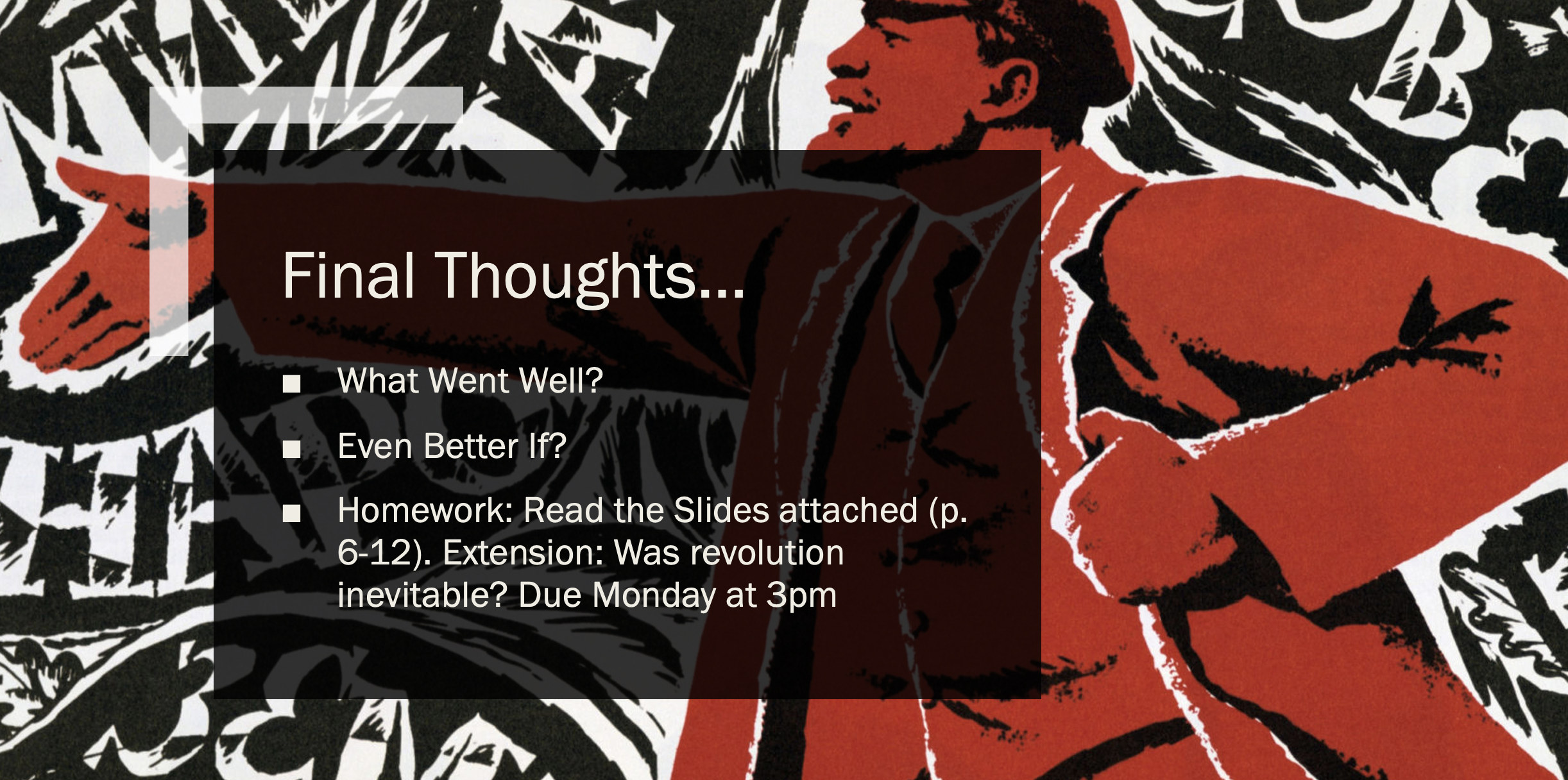
Attachments:
You must be logged in to view attached files. -
at 10:39 #42339
 EvaParticipant
EvaParticipantHi Beth!
Please find attached my homework for last week. I am extremely sorry for the lateness as I was travelling and did not have the opportunity to complete it in time. Thank you!
-Eva
Attachments:
You must be logged in to view attached files.-
at 11:51 #42473
-
-
at 11:02 #42341
Renren
ParticipantThis my answer to the second homework
The question of if the revolution was inevitable has many different answers and reasonings.
In the 20th century Russia was a mainly agricultural economy stuck in the old feudal system. Most Russians were surfs, owned by their master’s and forced to workday after day. Even after the serfs were set free in 1861, they were still drowning in poverty as they had to pay redemption payments to the government and their owners for 49 years. When Russia was final industrialized in 1860 it was done awfully and unevenly. The workers were treated awfully with low pay and low workers’ rights being some of the main complaints.The Tsar.
Politically Russia was a monarchy ruled by the tsar who had absolute power. Despite the tsar trying to reform the government such as the Russian duma, (a temporary parliament that was held until the 1917 revolution). In the end the tsar still had most of the power. It was said that the tsar was an awful ruler. His people starved while he attended lavish parties in Paris. This ruling system caused the main population of Russia to be unhappy with how the country was led, (maybe in the future causing a revolution)
WW1
WW1 acted as a main opportunity for Lenin to gain power from the civil unrest. Lenin took the advantage of having a country with huge problems and turned it into his own. The first problem with Russia was its economy. The war effort along with its late industrialization made Russia a very poor country. Peasants would starve because of food shortages while middle class workers saw the wages decline or facing the risk of losing their job. Lenin used this perfectly with the slogan peace bread and land appealing to the peasantry and the middle class. Peace saw an end to the war which was decimating Russia, bread appealed to the starving peasantry and land showed that he wanted people to be wealthier.In conclusion, while it is impossible to say that the revolution was inevitable many major factors such as WW1 and the economy caused Russia to be a breeding ground for new political ideologies, and also hatred for the tsar and the current government. I believe that there was a very high chance that a revolution was going to happen.
-
at 11:58 #42475
-
-
at 10:42 #42391
BobQZ
ParticipantHi Beth, Please read the attachment for my homework for lesson 2. Sephi.
Attachments:
You must be logged in to view attached files.-
at 12:03 #42477
-
-
at 18:07 #42500
Beth
ParticipantSummary for Lesson 3
In today’s class we looked at Lenin and the early days of revolution. We began by learning about the timeline of events before the class conducted some independent research and then discussed why they thought the October revolution succeeded. We watched a video of history vs. Lenin and the class shared their own opinions on the subject beautifully, thinking carefully about both sides of the debate. Lastly we looked at primary sources, tracing the lives of Russians from before the revolution to after. Excellent focus and research today everyone- well done for all your interpretations and ideas and see you next week 🙂
Lenin video: https://www.youtube.com/watch?v=9N8hsXQapjY
BBC link for research: https://www.bbc.co.uk/bitesize/guides/zdq46v4/revision/3
PDF we looked at with timeline: https://www.marx-memorial-library.org.uk/sites/default/files/wp-content/uploads/2017/07/Brochure_1.pdf
Homework
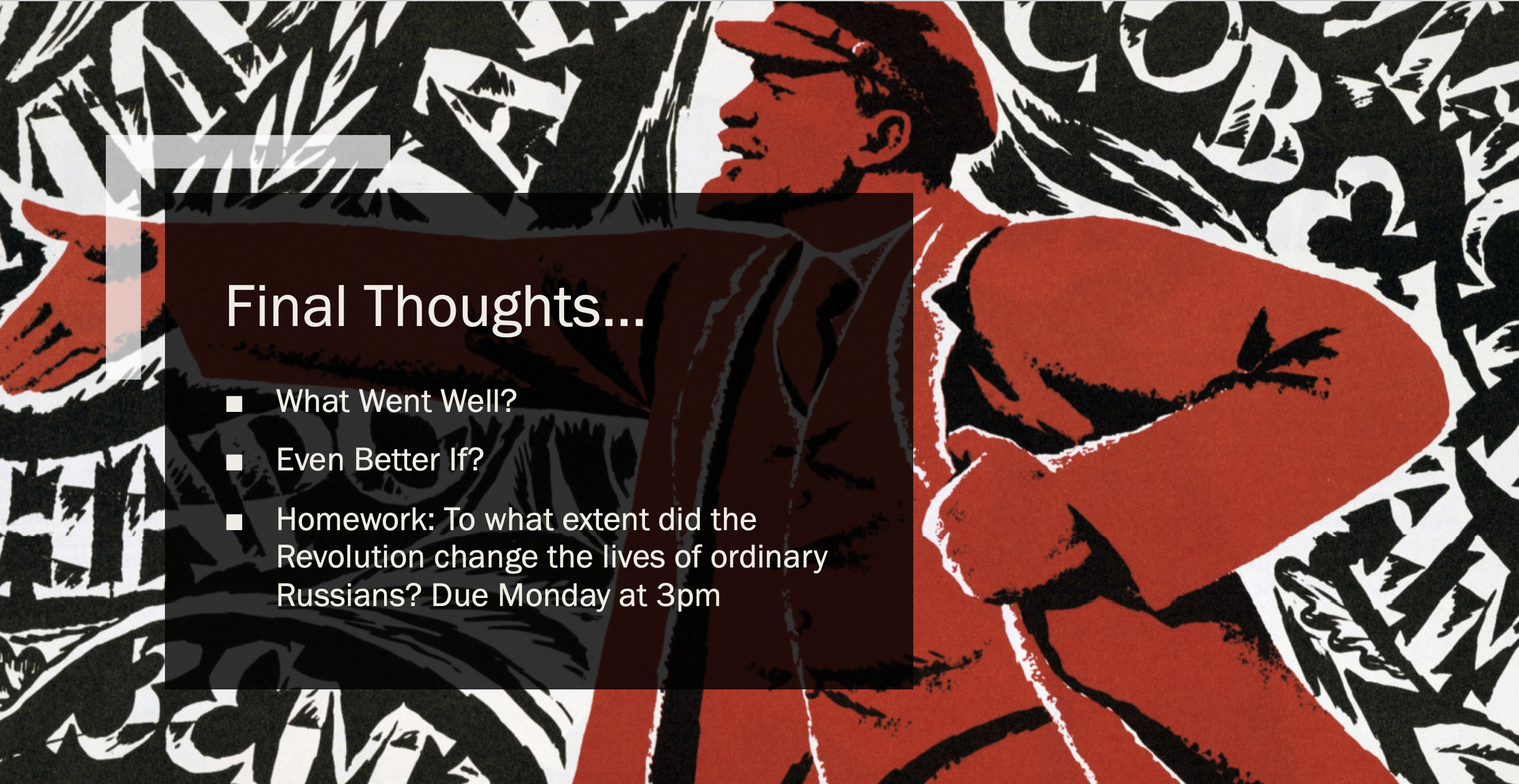
Attachments:
You must be logged in to view attached files. -
at 20:34 #42506
BobQZ
ParticipantHello Miss, this is my homework for lesson 3. Sephi
Attachments:
You must be logged in to view attached files.-
at 17:56 #42633
-
-
at 12:32 #42549
 EvaParticipant
EvaParticipantHi Beth!
Thank you so much for the amazing lesson!
-Eva
Attachments:
You must be logged in to view attached files.-
at 18:20 #42635
-
-
at 12:51 #42551
Renren
ParticipantMy Homework For the third lesson
There were many changes to the ordinary Russian people after the revolution, including pros and cons. There were many different types of changes, some more important than others. The extent of these differences in the people’s lives can be summed up in four categories. Political, Economic, social and cultural and finally the impact of the multiple wars that ravaged the country. I will now go into detail of these categories and explain their causes and impacts.
Political changes.
The Russian revolution ended the tsar’s monarchy. The Tsars government had a solidified social structure that made becoming richer very difficult in past Russia. It also had many dictatorial and oppressive policies that when finally lifted gave the Russian people a breath of fresh air. This change was very major as the normal people were no longer subject to the rule of a dictator.
The rise of the communist state also was a large political change where the people finally had a government that represented them. The Bolsheviks promised to represent the ordinary people along with the peasants for things such as workers’ rights.Economic changes.
The Bolshevik land redistribution was one of the most important changes after the revolution. The Bolsheviks took land from the church and the noble and redistributed it among the peasants. This was a hugely popular move among the mostly rural people and heavily altered the structure of life for many people.
The nationalization of industry was also a very large change. In this the Bolsheviks took many businesses such as factories and banks and nationalized them. This was a move that was intended to help the poor, it led to significant disturbances in Russia’s economy turning it from a free market to a planned economy caused food shortages, poverty and inefficiency in work causing Russia’s economy to plummet.Social and Cultural Changes.
The Russian revolution had a target of cleansing the old class system. The nobility and the clergymen lost their status of privilege while the ordinary people were elevated. In reality the members of the communist party such as Lenin, Stalin and Trotsky earned so much power that they almost became dictators themselves.
The new government also pushed for women’s rights. Bolsheviks had a surprisingly progressive policy on women’s rights such as legalizing divorce, introducing maternity leave and giving women the right to vote. This meant that Russia was the second country ever that allowed women to vote right after New Zealand.
Now for the cultural side of the revolution, The Russian revolution also caused a revolution of education. The Bolsheviks goal was to eradicate literacy. This ended up too much more increased access for educations for the ordinary people as well as Literacy rates nearly doubling. In 1918 a year after the Bolsheviks took over, only half of the red army’s soldiers could read and write. Whereas in 1925, only six years after the new government 100 percent of the red army’s soldiers were fully literate and could both read and write.
The new government also created a new communist culture that would replace the old noble system. This included promoting communism in art and attacking religion. The Russian church was prosecuted while atheism was supported.The last category is war.
The Russian civil war between the Bolsheviks and Mensheviks Destroyed the country. Many civilians suffered from mass violence loss of lie and losing workers from the war. WW1also ha a very large impact on Russia with its 2.5 million casualties and its army being heavily weakened. These two wars together caused widespread famine in Russia. Along with the Inefficiency of communism and poor harvests, famine fell upon the Russian people an example of this was the 1921 famine that killed almost 5 million people, (more than the war). In total there were estimated to have been 10 million people that died to starvation while the Bolsheviks were in control.In conclusion The Russian revolution Altered the lives of the ordinary people from the foundation. The old class system was dismantled, the government formed new ideologies. However, the revolution brought many hardships to the people of Russia. So, to answer the question, I believe that the revolution changed the lives of the Russia people so much that they could’ve become new people.
-
at 12:40 #42639
-
-
at 19:19 #42648
Beth
ParticipantSummary for Lesson 4
In today’s class we learned about Trotsky and Stalin, thinking about the power struggle between them and what it meant for the world. We spoke about Stalin’s rise to power, learning about how he used political prowess to take control, and the class completed a fantastic research task on him in pairs. We looked at the way in which the Revolution became like an Ouroborus, a snake eating its own tail, and thought briefly about the international consequences of Stalin’s rule. We also thought about his early life and how it informed the leader he became. Amazing work today class, very impressive ideas and research throughout. Keep it up and see you next week 🙂
Link from today: https://www.nationalww2museum.org/war/articles/trotskys-struggle-against-stalin
Origins of Cold War vid: https://www.youtube.com/watch?v=BlFjNf4f0mE&t=192s
BBC link: https://www.bbc.co.uk/teach/articles/zhv747h
Homework
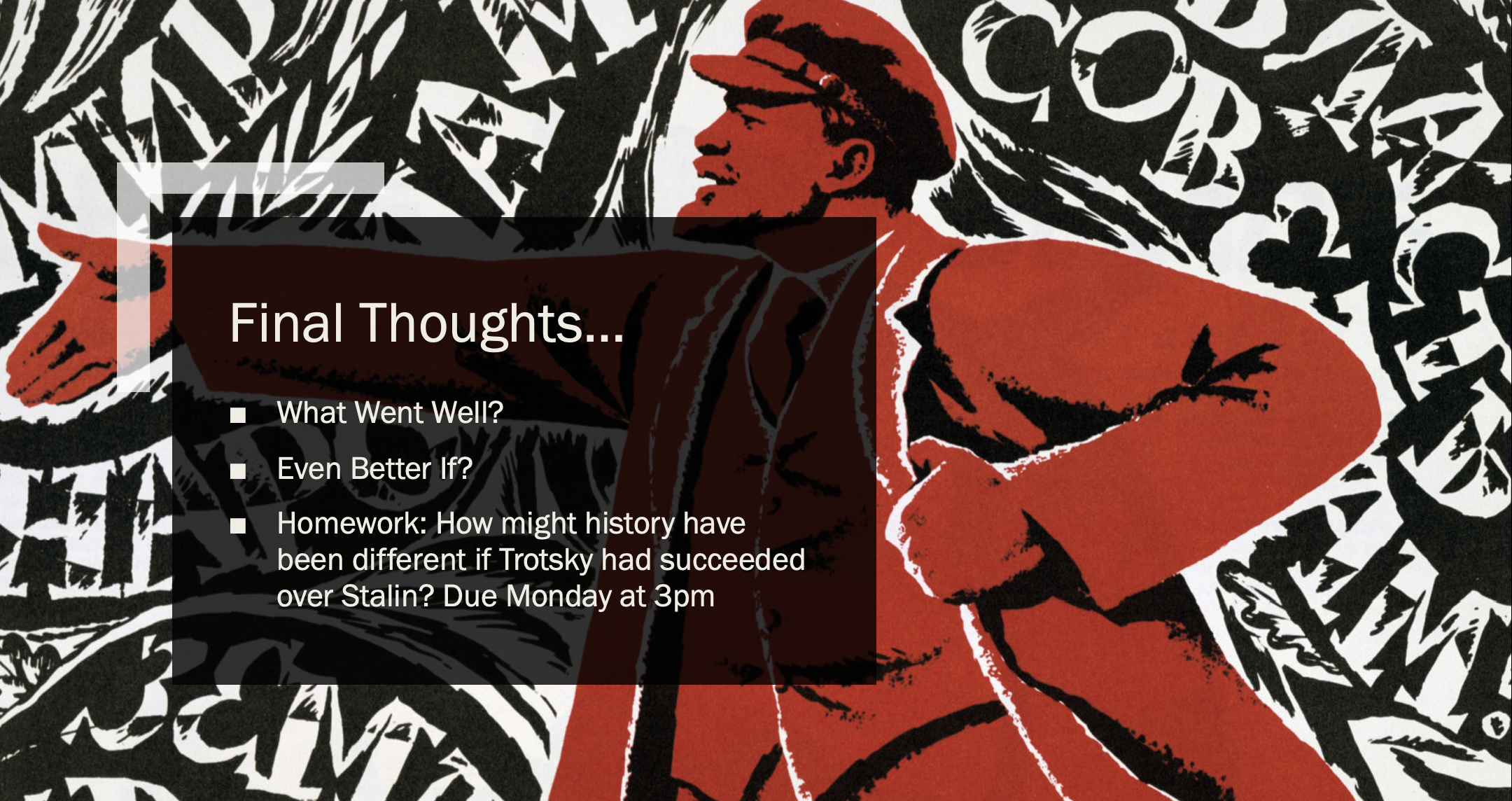
Attachments:
You must be logged in to view attached files. -
at 11:20 #42657
 EvaParticipant
EvaParticipantHi Beth!
Thank you so much for the superb lesson!
-Eva
Attachments:
You must be logged in to view attached files.-
at 14:03 #42720
-
-
at 19:22 #42673
BobQZ
ParticipantHi Beth, heres my HW for lesson 4. Sephi
Attachments:
You must be logged in to view attached files.-
at 14:15 #42722
-
-
at 12:24 #42684
Daniel
ParticipantHi Beth
Thanks for the great lesson. Please find my homework below. Have a good week!
https://docs.google.com/document/d/1WiY3Q1QOnUS2QoU0OSSnTVS5p_dyom565AMO3eZjDbw/edit
Best Wishes
Daniel
-
at 15:28 #42724
-
-
at 18:36 #42732
Beth
ParticipantSummary for Lesson 5
In today’s class we learned about the Russian Revolution’s legacy, thinking about its impact economically, politically, ideologically and in human terms. We read articles on the topic and discussed our feelings towards the arguments they made, and thought about breaking down the impact into long and short term. We revised the events of the Revolution from 1917-1922 and looked together at an essay by China Mieville on the lasting impact and why it matters. Finally we touched on a quotation regarding its legacy. Some good work today class, well done! Good luck with your revision and I look forward to seeing you next week 🙂
Legacies link: https://globalejournal.org/global-e/november-2017/legacies-russian-revolution
Why it matters link: https://www.theguardian.com/books/2017/may/06/russian-revolution-matter-china-mieville
Homework
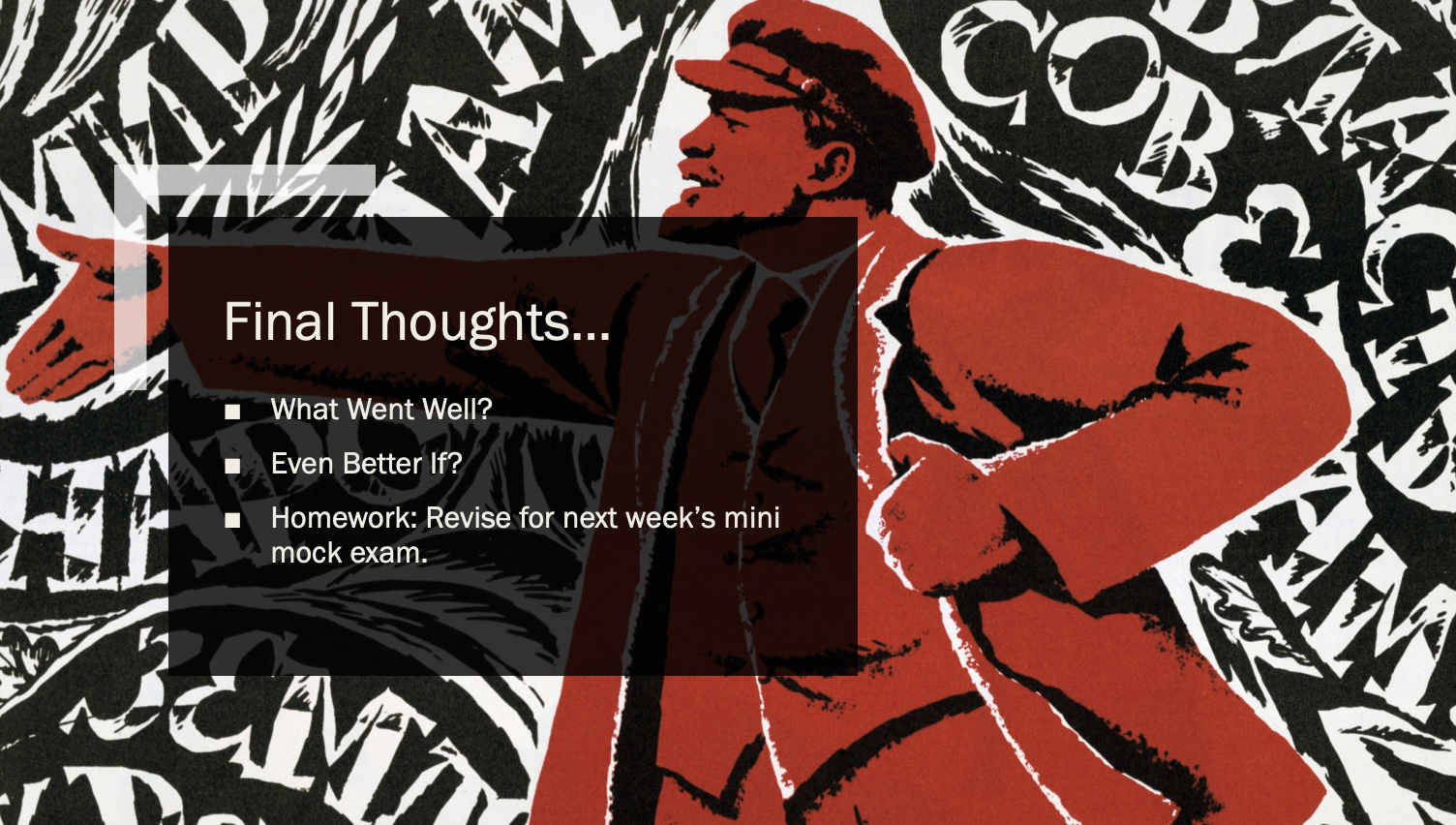
Attachments:
You must be logged in to view attached files. -
at 17:58 #42843
BobQZ
Participant-
at 09:27 #42963
-
-
at 18:02 #42845
Renren
ParticipantMy mock test for this lesson:
Was the Russian revolution the most important event of the 20th century in Europe.
The Russian revolution definitely deserves its spot on the podium as one of the most significant events of the 20th century not just in Europe but all around the world. This revolution marked the overthrowing of the Russian monarchy and stopping Russias involvement in ww1. But the most importantly, it led to the establishment of a superpower that would later cause tremors across the earth. However to claim it as the most important event of European history I’m the 20th century requires much analysis.
The significance of the Russian revolution can be seen in its immediate and long lasting effects On not just European but global affairs. One of the biggest effects was the building of the Soviet Union. The Soviet Union started a wave of revolution fever throughout Europe leading to civil unrest in nations such as Germany, Vietnam, China and the two Koreas. The Russians success demonstrated the feasibility of a working communist state and gave the western powers a wake up call about the soviet states immense power but also the ideological battle between communism and capitalism. This battle became the foundation of the Cold War. The cold war was definitely the turning point of modern history. The proxy wars that Russia and America fought ravaged many nations economies and infrastructures and killed millions of people.
Despite the cold wars significance, you still cannot forget the effects of the revolution on the two world wars. Especially ww2. Ww1 altered European political from the foundations. But even more importantly, it made the base plate for ww2. The consequences of ww2 were more extreme. Nearly all of Europe and most of Asias infastructures were decimated . Even worse was the holocaust that killed millions of innocent Jews, among many others.but what I believe to be the most important was the establishment of the United Nations. A powerful association that keeps all people regardless of who they are safe and protects their human rights. All of this wouldn’t have happened if russia did not play its pivotal part in ww2 against the Germans. It was the Russians that defeated a large chunk of Germans army when Germany attacked them. It was also the Russia that took Berlin. A mark of the Germans defeat in ww2. Without the Russians who knows what could have happened to us.and without the revolution Russia may not have been powerful enough to defeat the germans.
In conclusion the Russian revolution was undoubtedly the most important event of the 20th century not just in Europe but around the world. The Russian revolution caused the Cold War, which ravaged the earth and it still rings on today, but also its involvement in defeating the Germans in ww2 to make sure that they didn’t win the war. These were both some of the most important things that they did. In conclusion, I believe that the Russian revolution was definitely the most important event of the 20th century not just in Europe but across the world.
-
at 09:49 #42965
-
-
at 18:03 #42846
Jessica
ParticipantThe Russia Revolution was the most important event of the 20th Century in Europe- Agree or Disagree?
The Russian Revolution of 1917 marked a crucial turning point in European history. It left to countless things, including the demise of the Romanov dynasty and the establishment of the worlds first communist state. The revolution was driven by a combination of social, political, and economical factors, including wide spread discontent among the Russian population, hardships caused by World War I, and growing support for socialist ideas among the working class. The events in Russia sent a shockwave throughout Europe and inspired similar revolutionary movements in countries such as Germany, Hungary and Italy. I believe it is one of the most, or even is the most important event of 20th century Europe.
By overthrowing traditional monarchies and aristocracies, the Russian Revolution paved the way for an alternative in European politics. The founding of a Soviet Union, created as supreme communist state represented surrounded by capitalist states in Europe helped to ignite east vs west conflicts throughout most of the century. It also greatly affected the European working class, because it showed that there is strength in numbers — and they can overturn dictatorial governments to get improved work environments, paychecks and modes of life.
The Russian Revolution also had a profound impact on European culture and ideology. Across the continent, the ideas of Marx and Lenin were taking root in radical art,music, poetry and life styles inspiring artist, writers and intellectuals to explore new ways of thinking. The revolution sparked debates about the very nature of power, equality and justice which still resonate in European societies. At the end of everything, therefore, the 1917 Russian Revolution was a turning point in historical past and did have an effect on immensely more than merely all that then lived through it; by using reshaping political along with public life far after the revolution took place. Put simply, there are many things that wouldn’t have take place without the revolution, which is why I believe it is one of, or even the most important event of the the 20th century in Europe
-
at 11:44 #42969
-
-
at 18:07 #42847
 EvaParticipant
EvaParticipantHi Beth!
Thank you so much for the amazing course! I had a third point planned but I ra out of time and decided to finish the conclusion first.
Thank you!
-Eva
Attachments:
You must be logged in to view attached files.-
at 12:02 #42971
-
-
at 17:39 #42873
Beth
ParticipantSummary for Lesson 6
In today’s class we wrote a mock exam in timed conditions, where the class chose between two questions and reflected on all they had learned. Well done today and for your work this summer everyone, you have all synthesised a lot of information very adeptly and I’ve been really impressed by your knowledge and discussions. Keep up the great work and see you next course 🙂
Homework
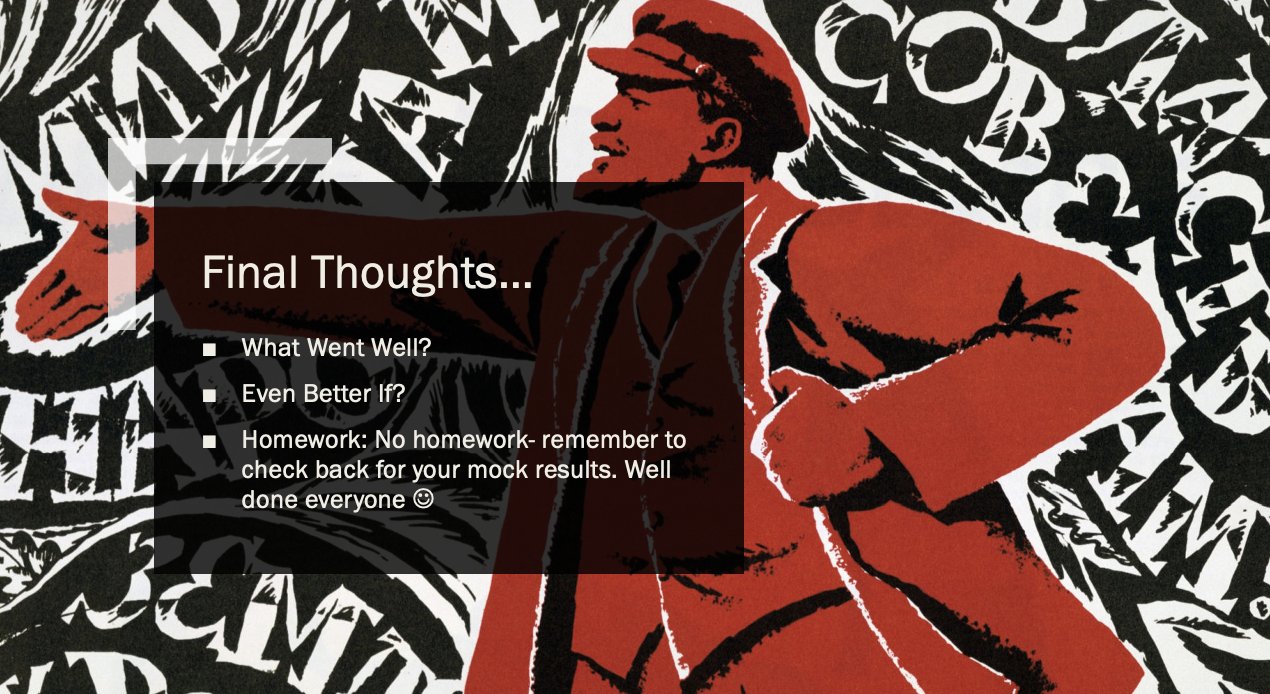
Attachments:
You must be logged in to view attached files.
-
-
AuthorPosts
- You must be logged in to reply to this topic.
